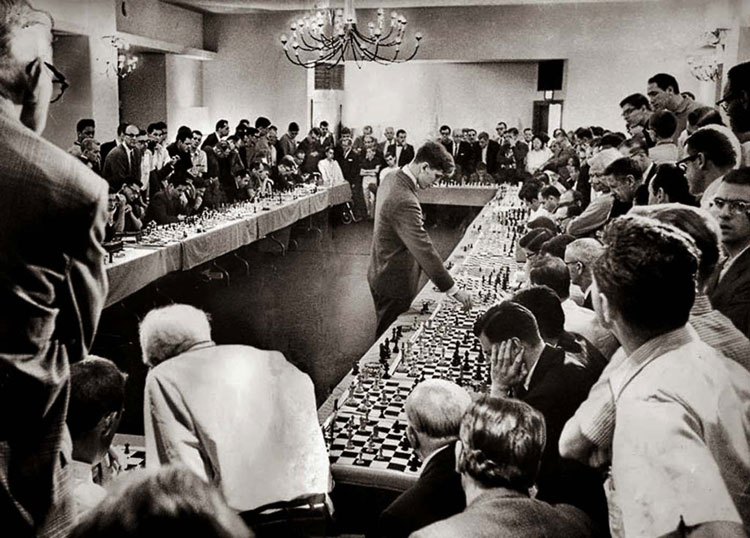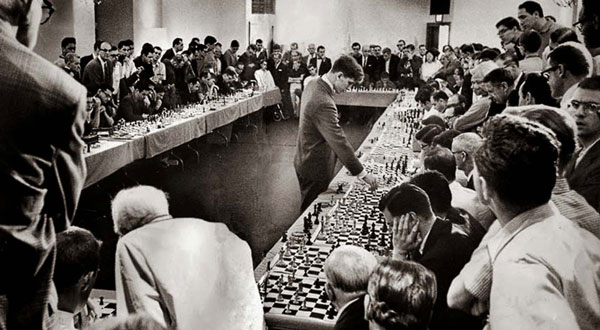Bobby Fischer is considered by many to be the greatest chess player who ever lived. In this particular simultaneous exhibition, he won 47 of the matches, drew 2 and lost 1. He lost to Donn Rogosin, not a well-known player. Fischer was 21 during this tournament.

Bobby Fischer is playing white in this tournament, which is an advantage in high-level chess. The one playing white can choose an opening that he knows best. He gets to decide which direction the game’s going to go for the first few turns.
There are variations and choices one can make after a few moves. But grand masters know most of these of course and a lot of preparation goes into finding answers to the opening you expect from the other opponent.
After only 4 moves, there are already millions of possible choices!
The best thing about chess is there are so many ways to create an entirely unique game for yourself each time. Strategies and patterns often repeat, but positions vary.
Bobby Fischer showed great potential and skill at an early age.
At age 13 he won a “brilliancy” that became known as “The Game of the Century”. Starting at age 14, Fischer played in eight United States Championships, winning each by at least a one-point margin.
At 15, Fischer became both the youngest grandmaster up to that time and the youngest candidate for the World Championship.
At 20, Fischer won the 1963–64 U.S. Championship with 11/11, the only perfect score in the history of the tournament.
His book My 60 Memorable Games that was published in 1969 became an icon of American chess literature and is regarded a masterwork.
Fischer won the 1970 Interzonal Tournament by a record 3½-point margin and won 20 consecutive games, including two unprecedented 6–0 sweeps in the Candidates Matches.
In July 1971, he became the first official FIDE number-one-rated player.
After losing his title as World Chess Champion, Fischer became reclusive and sometimes erratic, disappearing from both competitive chess and the public eye. In 1992 he reemerged to win an unofficial rematch against Spassky.
It was held in Yugoslavia, which was under a United Nations embargo at the time. His participation led to a conflict with the U.S. government, which sought income tax on Fischer’s match winnings, and ultimately issued a warrant for his arrest. After that, he lived his life as an émigré.
In 1990s, Fischer patented a modified chess timing system that added a time increment after each move, now a standard practice in major tournament and match play.
Great quote from Peter Biyiasas, a champion he beat:
He was too good. There was no use in playing him. It wasn’t interesting. I was getting beaten, and it wasn’t clear to me why. It wasn’t like I made this mistake or that mistake. It was like I was being gradually outplayed, from the start. He wasn’t taking any time to think. The most depressing thing about it is that I wasn’t even getting out of the middle game to an endgame. I don’t ever remember an endgame. He honestly believes there is no one for him to play, no one worthy of him. I played him, and I can attest to that. It’s not interesting.

